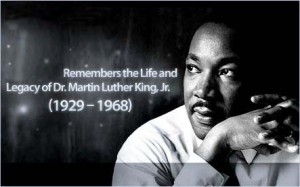Martin Luther King Jr., Free Market Reformer?
Posted on January 17, 2011
 Barack Obama. Oprah Winfrey. Robert Johnson. Dick Parsons. Bill Cosby. Michael Jordan. Tiger Woods.
Barack Obama. Oprah Winfrey. Robert Johnson. Dick Parsons. Bill Cosby. Michael Jordan. Tiger Woods.It goes without saying that all of these individuals owe a great deal to Martin Luther King Jr., who is remembered today on the anniversary of his birth.
Milton Freidman. Frederich Hayek. Ayn Rand. Adam Smith. Ronald Reagan. Jack Kemp. Arthur Laffer. Dick Armey.
It might be less obvious that this second group owes every bit as big a debt to King’s legacy.
King’s legacy isn’t just about civil rights; although that is quite appropriately the reason most people celebrate him today.
But he also fought against, in his own way, with his own style, the restraint of the free market, even though he might not have known it at the time.
King may have thought himself a democratic socialist, and David Garrow, the historian, said that he told close friends that he considered himself a Marxist. In fact, he once said, "good and just society is neither the thesis of capitalism nor the antithesis of communism, but a socially conscious democracy which reconciles the truths of individualism and collectivism."
That doesn’t sound very much like a committed capitalist, now does it?
But King’s major mission was to fight for freedom for all people to achieve their dreams. What could be more important to the free market than freedom?
Slavery assaults the free market.
Whether that slavery happens in Soviet Russia, Communist China, modern day North Korea, or in the Confederate (and post-Confederate) South, slavery limits economic growth, inhibits entrepreneurship, stymies creativity, and kills progress.
It is the principle reason that the South stayed mired in an agrarian economy for all of the 19th century and slavery’s legacy stymied the South for most of the 20th century.
The free market prospers when free people engage in free commerce. When consumers, workers and employers --no matter what their color, creed or sex -- are able to freely associate with whomever they want to associate with, then the market will explode in activity.
Jim Crow, Separate but Equal, Miscegenation Laws, Red-Zoning, all of these laws were an assault on the notion of free assembly and free commerce. All of them were against America’s highest aspirations and highest ideals. All of them were self-defeating and anti-capitalist.
Now, King wasn’t exactly a free-market purist. He believed in affirmative action. He believed that the government should step into the market place often. He believed in price controls. He called himself a Marxist.
But, in his heart of hearts, he wasn’t a Marxist. A Marxist calls for violent revolution. King abhorred violence. A Marxist calls for the restriction of freedom. King’s message, at its heart, was clarion call for more freedom.
Our nation celebrates Martin Luther King Jr. today. He may not have known it at the time, and he may not have felt it, but he was a free-market reformer.
His free market reforms have helped people like Oprah Winfrey, Robert Johnson of BET and Richard Parsons of Citi Group and, yes Barack Obama, rise to the top of American society.
He should be celebrated not only by those who care deeply about the civil rights movement, but also by those who care deeply about free market capitalism and the triumph of freedom over slavery.
